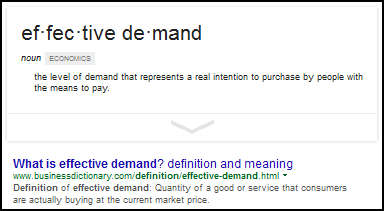Google:
Small Business by Demand Media:
What Is the Difference Between Demand and Effective Demand?
by Ronald Kimmons, Demand MediaDemand
Demand is the term that economists use to describe the ability and willingness of buyers to purchase a product or service. This is a general term that takes a number of issues into account, such as buyer income, buyer perceptions and buyer needs. Demand is a market force opposite of supply, which is the ability and willingness of producers and service providers to provide products and services on the market. This general idea of demand is often called notional demand, which is composed of both latent demand and effective demand.Latent Demand
Even if a buyer needs or would be willing to purchase a particular product or service, he cannot do so if he lacks the necessary funds or if he does not know about that product or service. This portion of market demand is called latent demand. The importance of latent demand is that it presents an opportunity to firms to increase revenue by investing in marketing efforts or introducing low-cost products.Effective Demand
Effective demand is a representation of the actual amount of goods or services that buyers are purchasing in a given market. Effective demand is the difference between notional demand and latent demand. Effective demand is a reflection of the extent to which buyers' income, perceptions and needs combine to result in an actual purchase rather than a mere desire to purchase.In recent comments at Angry Bear I said to Ed Lambert:
I would suggest again that what you are measuring is potential demand, not effective demand.
Lambert replied:
The term “effective” implies a limit. So it is better than “potential”. But the terms are very close.
Potential output has been surpassed many times, but not effective demand. Effective implies the top limit.
I refer you to the definitions above, from Google and Ronald Kimmons. I still think "potential demand" is the better name for the work Lambert is doing. But of course, I might misunderstand him.
Here's my problem: If I can't get clear on what he's looking at, I can't even begin to understand what he's saying. He's definitely not looking at effective demand as defined by Google and Ronald Kimmons.
//
A year back, at Angry Bear, I wrote:
I’m thinking Lambert’s “effective demand” is really a kind of POTENTIAL DEMAND. After all, Lambert says “The best way to think about effective demand is the unused capacity of demand in the economy.” What he is describing is demand in an economist’s perfect world, just as Potential output is a measure of real output in that perfect world. Though even that perfect world is far from perfect.
Lambert, your explanations help. But your use of the words “effective demand” troubles me because I think it differs from Keynes’ use of those same words, and from Adam Smith’s words “effectual demand”… both of which refer to the amount of money people actually spend.
Back then, Lambert himself wrote:
if unused supply of labor and capital is high, potential demand is going unfilled. Think of effective demand as potential demand. Yet potential demand is constrained by labor share of income.
Effective demand is demand backed by purchasing power. I think Potential demand is a measure of the most that effective demand could be. I think Lambert is doing Potential demand. And I think it might be real genius. But effective demand is something different.

This argument has great potential. I'm not sure it will be effective. :)
ReplyDeleteAhh, Nanute!
ReplyDeleteAhh, Art! Ed has a few recent posts up on Effective/Potential demand. Whether or not you agree with his choice of word, and his definition, I think he's onto something. http://angrybearblog.com/2014/08/look-ed-monetary-rule.html
ReplyDeleteThe term comes from Keynes' General Theory, and probably does not correspond to the definition you presented. Keynes didn't have a model, though, and Edward has constructed one.
ReplyDeleteThe word "effective" in this context seems counter intuitive.
I have a difficult time wrapping my head around it.
Cheers!
JzB
Jazz: "The word "effective" in this context seems counter intuitive.
ReplyDeleteI have a difficult time wrapping my head around it."
My problem exactly.
Edward may have a model, but the term (from the General Theory) most certainly does not correspond to Edward's definition.
Wrapping my head around...yes a difficult thing. Wrapping my heart around it...kind of hard too but a wee bit easier.
ReplyDeleteHope you don't mind me commenting....just a practical economist view...inviting you onboard...
http://iriewealthonearth.weebly. com/aggregate-demand